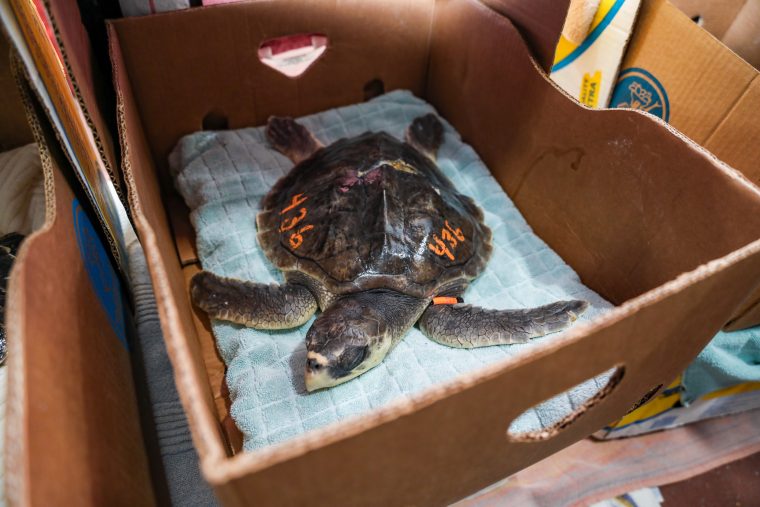Volunteer pilots fly turtles triaged at New England Aquarium, National Marine Life Center to secondary rehabilitation facilities

BOSTON, MASS. (Dec. 13, 2022) – As high numbers of sea turtles strand on the shores of Cape Cod this season, 100 turtles treated locally for hypothermia are on their way to secondary rehabilitation facilities in Mississippi and Florida, making room for new arrivals in Massachusetts.
**PHOTOS AND VIDEO AVAILABLE HERE, WITH CREDIT TO NEW ENGLAND AQUARIUM**
Each year, hundreds of cold-stunned sea turtles wash up on the beaches of Cape Cod. Because of the rapidly changing water temperature and wind pattern, many turtles cannot escape the hook-like area of Cape Cod Bay before becoming hypothermic. That’s when staff and volunteers with Mass Audubon’s Wellfleet Bay Wildlife Sanctuary come in, patrolling the beaches for stranded turtles and transporting the animals to the New England Aquarium’s Sea Turtle Hospital in Quincy, MA, and National Marine Life Center (NMLC) in Bourne, MA, to be triaged and rehabilitated. As the facilities fill up, the Aquarium works closely with the National Oceanic and Atmospheric Administration (NOAA) Fisheries Service and the non-profit organization Turtles Fly Too to transport some turtles to organizations that can continue the rehabilitation process and free up space for new patients.
On Tuesday, 93 Kemp’s ridley turtles from the New England Aquarium and another seven from NMLC traveled to The Florida Aquarium, Clearwater Marine Aquarium, Mississippi Aquarium, and the Institute for Marine Mammal Studies (IMMS). At IMMS, with the assistance of DVM and VMT students, veterinarians from Mississippi State University’s College of Veterinary Medicine will provide thorough intake evaluations and establish customized plans of care.
“As we continue to receive more turtles almost daily, it is great to see many stable turtles heading south to continue their rehab process. These transports really highlight the outstanding collaboration of many organizations to return these turtles home,” said the New England Aquarium’s Director of Rescue and Rehabilitation Adam Kennedy.
More than 500 turtles have washed ashore on Cape Cod beaches so far this season, some of them already decomposed. The team at the New England Aquarium’s Sea Turtle Hospital has cared for more than 350 live sea turtles in the past three weeks and NMLC has treated 87, with the cold-stun season once again getting off to a late start as temperature fluctuations kept Cape Cod Bay warm for a prolonged period of time, a potential impact of climate change. The vast majority of rescued turtles are critically endangered Kemp’s ridley turtles, though a high number of green sea turtles have stranded this season.
“Greens are usually less tolerant of colder waters,” said Bob Prescott, Wellfleet Bay’s director emeritus, who oversees the sanctuary’s sea turtle rescue program. “But this was one of the warmest summers along the Atlantic coast. It’s also possible that Hurricane Fiona in September helped draw more greens into the Gulf of Maine.”
The turtles suffer from life-threatening medical conditions including pneumonia and dehydration, a result of becoming unable to regulate their body temperature and feed.
“When the sea turtles become cold stunned, they are susceptible to injuries while they are floating out at sea as well as when they are stranded on the beach. They cannot escape boat propellers, predators or scavengers. We have seen a lot of those injuries this season, and we work closely with our network partners to provide medical care to these animals as quickly as possible,” said Lisa Becker, director of marine wildlife rehabilitation at NMLC.
Once turtles are stabilized, staff veterinarians examine animals that need further care and clear others for travel to secondary rehabilitation facilities. More critical turtles remain at the New England Aquarium long-term, where many will complete their full rehabilitation process before being released back into the ocean.
NOAA Fisheries staff identify rehabilitation centers across the country that can accept the stabilized turtles, which frees up room for newly stranded turtles requiring treatment in Massachusetts. Turtles Fly Too plays a key role in transporting the turtles to these facilities.
“At this crucial moment, our pilots (Turtle Fliers) come to the turtles’ aid to act as their wings. Upon stabilization, these cold-stunned turtles are flown to hospitals for additional rehabilitation and given a second chance,” stated Leslie Weinstein, president of Turtles Fly Too. “Turtles Fly Too aims to ensure the challenges facing protected endangered marine species and those who care for them are met with clear solutions and real actions. Extinction is forever.”
“Kemp’s ridley sea turtles are critically endangered. Recovering these species involves a huge collaborative effort between federal and state government agencies, and private organizations working towards reducing threats on their nesting beaches and ocean habitat,” said Kate Sampson, sea turtle stranding and disentanglement coordinator for NOAA Fisheries.
The number of annual cold-stunned sea turtle strandings in Massachusetts varies from year to year but has steadily increased from around 50 in 2000 to more than 700 in 2021. Researchers have predicted through statistical modeling that by 2031, these events will bring thousands of sea turtles to our shores annually. Dozens of organizations across the country have stepped up in recent years to ensure each season is a conservation success for sea turtles.
“One important piece of the conservation puzzle is the rescue and rehabilitation of sick and injured turtles, such as the hundreds of cold-stunned turtles that wash up annually in Massachusetts,” Sampson said. “It is only through the tireless efforts of the Wellfleet Bay Wildlife Sanctuary, New England Aquarium, National Marine Life Center, Turtles Fly Too, and all the rehabilitation facilities throughout the East and Gulf coasts (and beyond) that receive turtles for long-term care that this rescue effort is successful. Each year, this amazing collaboration returns hundreds of healthy Kemp’s ridley sea turtles back into the ocean to rejoin the reproductive population.”
MEDIA CONTACT:
Pam Bechtold Snyder – psnyder@neaq.org, 617-686-5068
